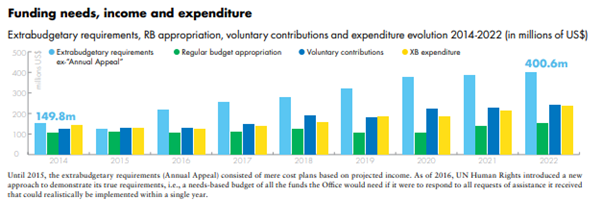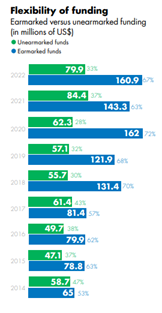Funding Trends
Regular budget versus voluntary contributions
In 2022, the first year of the extended OMP 2022-2023, the approved regular budget appropriation for UN Human Rights, as a department of the United Nations Secretariat, was US$133.9 million. While this represents an increase from the appropriation of US$129.3 million received in 2021, it only accounts for approximately 4.3 per cent of the total UN regular budget.
In 2022, approximately 38.7 per cent of the funding for UN Human Rights came from the United Nations regular budget. Consequently, approximately 61.3 per cent came from voluntary contributions. Further details are presented in the graphs below:


Number and typology of donors

In 2022, UN Human Rights received funding from a total of 87 donors, compared to 89 in 2021. In UN Human Rights funding history, the total number of donors that contributed to UN Human Rights was lowest in 2015 (71) and highest (89) in 2018. This includes 24 non-state donors, such as private sector and multilateral donors. Although the Office continues its efforts to broaden the donor base, the majority of voluntary contributions are still from Member States.
In 2022, 63 Member States contributed to UN Human Rights, providing a budget of US$188.6 million and representing 78.3 per cent of all contributions received. During 2013-2021, the number of contributing Member States fluctuated between its lowest (59) in 2021 and its highest (70) in 2013. The total number of donors that contributed to UN Human Rights was lowest in 2015 (71) and highest (89) in 2018 and 2021. Of the 63 Member States that contributed in 2022, 53 had contributed in 2021. In addition, 31 of the 63 contributing Member States increased their support (in local currency) over the previous year and 47 provided unearmarked funding.
Of the 63 Member States that contributed in 2022, 25 were members of the Western European and Others Group (out of 29 Member States comprising the group); 15 were from the Asia-Pacific Group (out of 54 Member States comprising the group); 12 were from the Eastern European Group (out of 23 Member States comprising the group); eight were from the Latin American and Caribbean Group (out of 33 Member States comprising the group); and three were from the African Group (out of 54 Member States comprising the group).
From 2014 to 2022, the number of donors per regional group fluctuated between 24 and 26 for the Western European and Others Group, between 14 and 19 for the Asia-Pacific Group, between nine and 15 for the Eastern European Group, between five and 10 for the Latin American and Caribbean Group and between one and five for the African Group.
In 2022, the donor base included 24 non-State donors, composed of multilateral organizations, the private sector and the UN system, representing a decrease from 30 in 2021. It gradually increased from six in 2012 to a total of 26 in 2018, the second highest level to date, down to 18 in 2019 and 17 in 2020, before reaching 30 in 2021.

Earmarked versus unearmarked contributions

In 2022, UN Human Rights received US$79.9 million in unearmarked funds from 47 donors. In absolute terms, this was the second highest amount of unearmarked funds that UN Human Rights had raised after 2021 when it received US$84.4 million. Yet, the level of earmarking remains high at 67 per cent. Unearmarked contributions represent 33 per cent of the overall voluntary contributions received in 2022, representing a four per cent decrease from 37 per cent in 2021. From 2014 to 2022, the percentage of unearmarked funding fluctuated between 28 per cent (at its lowest in 2020) and 47 per cent (at its highest in 2014).
Some of the increase in earmarking can be attributed to locally sourced funding for fieldwork and contributions from non-traditional budget lines that can only be accessed as earmarked funds, such as humanitarian and development budget lines.
In-kind contributions
A number of Member States, namely Colombia, Qatar and Senegal, host UN Human Rights offices and provide in-kind support by covering some costs, such as the rent of premises, utilities and vehicles. These contributions are credited to their assessed contributions to the United Nations regular budget.
Junior Professional Officers
Some Member States provided UN Human Rights with additional, indirect financial support by contributing to the United Nations Junior Professional Officers (JPO) Programme, which is administered by DESA, in New York. In 2022, 41 JPOs (29 women, 12 men) were working at UN Human Rights and were supported by 15 governments, namely: Bahrain, Belgium, China, Denmark, Finland, Germany, Iceland, Italy, Japan, Netherlands, Norway, Saudi Arabia, South Korea, Sweden and Switzerland. Belgium and the Netherlands also funded JPOs who were nationals of developing countries. Two of the 41 JPOs were non-nationals. In terms of location, 28 JPOs were deployed to headquarters (25 in Geneva and three in New York) and 13 were deployed to the field (five in the Africa region, five in the Middle East and North Africa region, two in the Asia-Pacific region and one in the Americas region).
United Nations Volunteers
UN Human Rights benefited from indirect financial support through the UNV Programme, which is administered by UNDP. In 2022, a total of 234 UNVs (140 women, 94 men) served with UN Human Rights. Of these, 51 per cent were national UNVs. As of 31 December, 19 UNVs were working with UN Human Rights and were fully funded by the Governments of Finland, France, Germany, Ireland, Norway, Spain, Sweden and Switzerland.